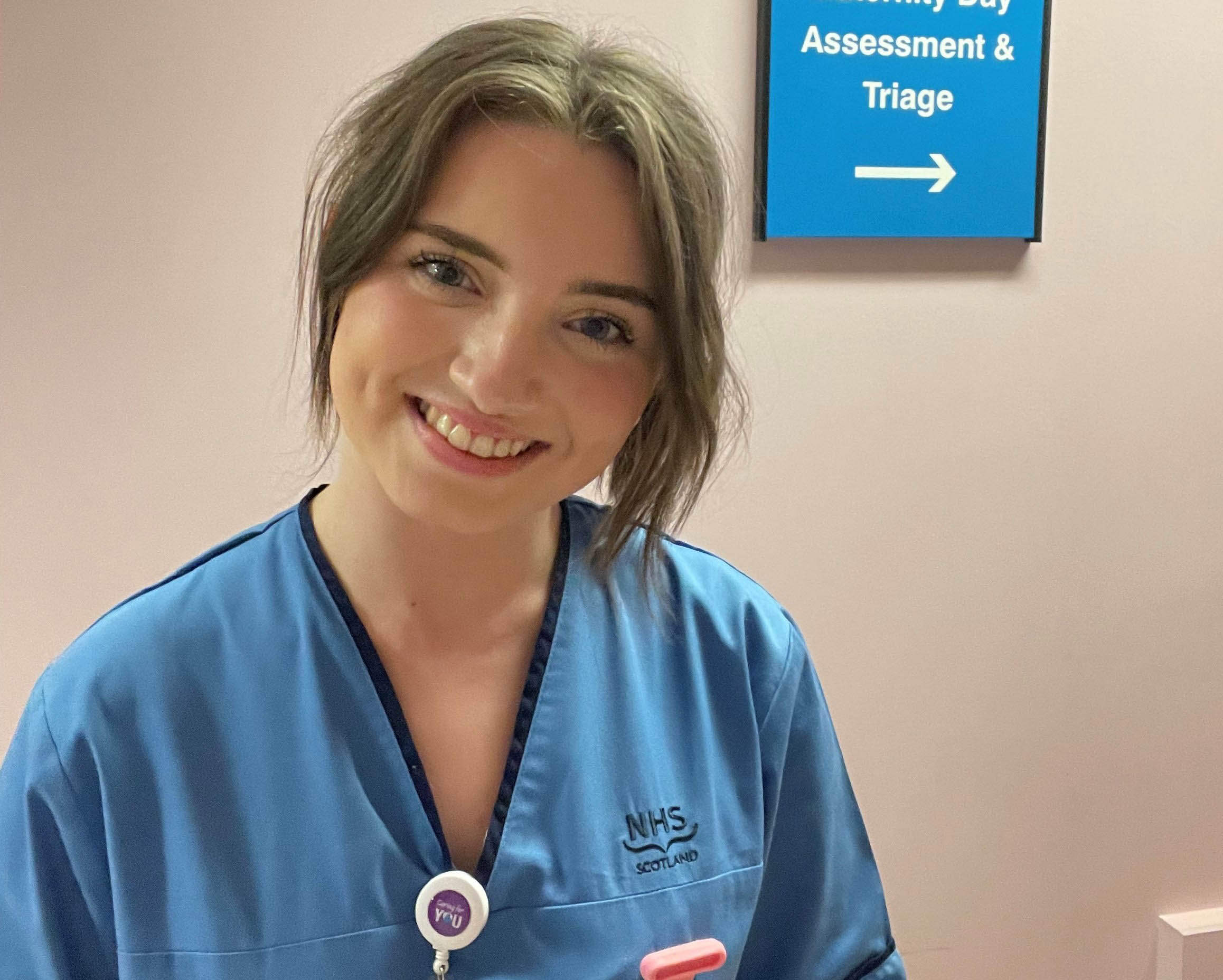To mark International Day of the of the Midwife, new midwife Emily Seggie describes joining the NHS Lanarkshire team as a midwife during the pandemic.
When people ask me when I knew I wanted become a midwife, I am never sure what to answer. I don’t recall ever making the decision that this was the career path I wanted to take. However, at aged 10 I wrote in my primary school yearbook that my future ambition was to become a midwife – but in all honesty I think I probably thought that meant a housewife at the time.
I am always incredibly proud to tell people I am a midwife, but never more so than over the past year where the efforts of all those within the NHS have been appreciated massively. With 2020 being the year of the nurse and midwife, and the enthusiasm of being a newly qualified midwife, I was eager to enter my new role in midwifery. However, if somebody would have told me then that I would have to face a global pandemic – as well as adjusting to my new role – I would be completely daunted by the prospect. I remember at the beginning of the pandemic, head to toe in full PPE under a hot light waiting for the arrival of a baby, a dad told me he couldn’t understand why I did this. And at that point I had to agree that I didn’t understand how I could do it either.
Through the height of the Coronavirus I had to move out of my family home for five months due to family members shielding, and as a new midwife working in the changing pressures of a pandemic, I’d be lying if I said I hadn’t cried in the staff toilets more than a handful of times.
The anxiety of feeling out of my depth and constant self-doubt as to whether I was cut out to do this career loomed over me for many months. With long 12 hour shifts, it can become weary and the enthusiasm turns to tiredness. When this happens I always try to remember that although this is just another shift, for the women and their partners who visit us it is most likely one of their most important days of their lives.
The strength of the women I have encountered has been so inspiring to me. They have endured the fears and anxieties of a pandemic, giving birth in unprecedented circumstances. There has been a sense of solidarity in their shared experience, and seeing women connect has been an honour. Being there for them – sometimes as there only mode of support – has been something very special that I will take with me throughout the rest of my career.
It has been a tough necessity to have to enforce regulations around birthing partners and visitors. We understand how disheartening this has been on many women, to not be able to have the birth experience they had hoped for, however these unfortunate changes have been sadly a necessary step in order to protect the public and staff to prevent the spread of Coronavirus.
We, as midwives, are present in order to provide not only medical care, but emotional support during pregnancy. The enforcement of these rules has made the physiological support we give to women more important than ever. You are not just helping them to birth their baby, you are there to hold their hand and champion them along the way.
Graduating in late 2019, as a newly qualified midwife, I have had the opportunity to rotate within the maternity unit which allowed me to work within all aspects of maternity care throughout 2020. Currently working within the triage unit means I don’t get to deliver babies very often (on occasion when we don’t quite make it down the corridor) however this type of work comes with its own quota of fulfilment. Expectant mothers attend because they haven’t felt their baby move and the sigh of relief you both breathe whenever you hear that heartbeat or getting to know the couple who attend frequently and being able to be a familiar face for them in what is usually a nerve-wracking time.
Although it is a job that has its downsides. I always worried that being exposed to loss would make me numb to it, but every time you are by a mother’s side when she is told there is no heartbeat is a type of sadness you never get used to.
I remember reading how every midwife has a cairn in their heart and for every loss they experience a stone is added. Some days it can be really heavy and the sadness of the job outweigh the positives. But on days when it seems all too heavy, whether it be the best friends you made during your training or the team of brilliant midwives you work with on the ward, who look after you no matter how busy the unit may be, that is what gets you through.
I love my job and I never forget what privilege it is to be able to be with women at their most vulnerable and joyous times of their life. The shifts can be long and it’s easy to be consumed with the stress. When the shift finally ends and you get to go home, quite often you take what that day brought home with you. But every day, whether it’s witnessing the first time a new mother looks at her child- that grasp of a new-born’s hand around your finger – or even just a simple thank you – its reminds you of why you became a midwife in the first place.



